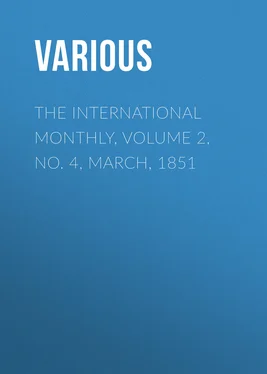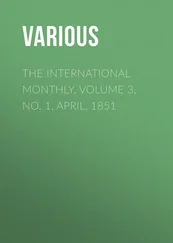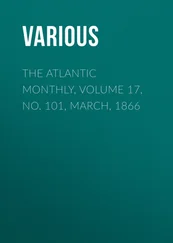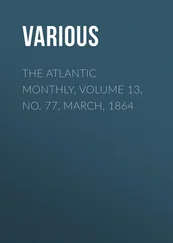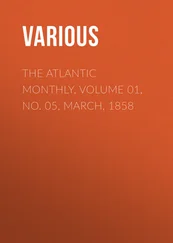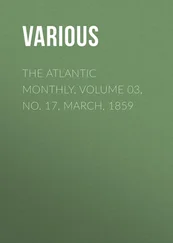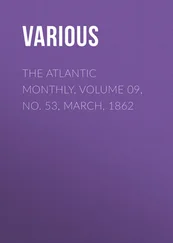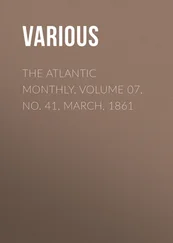Various - The International Monthly, Volume 2, No. 4, March, 1851
Здесь есть возможность читать онлайн «Various - The International Monthly, Volume 2, No. 4, March, 1851» — ознакомительный отрывок электронной книги совершенно бесплатно, а после прочтения отрывка купить полную версию. В некоторых случаях можно слушать аудио, скачать через торрент в формате fb2 и присутствует краткое содержание. Жанр: foreign_antique, periodic, foreign_edu, на английском языке. Описание произведения, (предисловие) а так же отзывы посетителей доступны на портале библиотеки ЛибКат.
- Название:The International Monthly, Volume 2, No. 4, March, 1851
- Автор:
- Жанр:
- Год:неизвестен
- ISBN:нет данных
- Рейтинг книги:5 / 5. Голосов: 1
-
Избранное:Добавить в избранное
- Отзывы:
-
Ваша оценка:
- 100
- 1
- 2
- 3
- 4
- 5
The International Monthly, Volume 2, No. 4, March, 1851: краткое содержание, описание и аннотация
Предлагаем к чтению аннотацию, описание, краткое содержание или предисловие (зависит от того, что написал сам автор книги «The International Monthly, Volume 2, No. 4, March, 1851»). Если вы не нашли необходимую информацию о книге — напишите в комментариях, мы постараемся отыскать её.
The International Monthly, Volume 2, No. 4, March, 1851 — читать онлайн ознакомительный отрывок
Ниже представлен текст книги, разбитый по страницам. Система сохранения места последней прочитанной страницы, позволяет с удобством читать онлайн бесплатно книгу «The International Monthly, Volume 2, No. 4, March, 1851», без необходимости каждый раз заново искать на чём Вы остановились. Поставьте закладку, и сможете в любой момент перейти на страницу, на которой закончили чтение.
Интервал:
Закладка:
Captain Medwin, whose book about Byron was once read by every body, and who for some time resided in this country, turns up in Holland, after an oblivion of several years. He contributes to the last number of the New Monthly an article entitled, Hawking at Loo .
John Clare, the peasant poet, sometimes called the "rural Burns," is now in the Lunatic Asylum at Northampton. There is much sweetness in some of poor Clare's verses, of which four volumes appeared many years ago. We believe he was among the proteges of Southey. His complaints to visitors of the madhouse are commonly of the injustice done to him by the public in not recognizing him, instead of Scott and Byron, as the author of "Marmion" and "Don Juan," and in refusing him the honor of having gained the battle of Waterloo. Clare was the writer, though not generally known as such, of the lines, "Here we meet too soon to part"—which, set to one of Rossini's most beautiful airs, were some time exceedingly popular.
A new volume of the writings of De Quincey has just been published by Ticknor, Reed & Fields, of Boston. It contains, with other admirable papers, those "On the Knocking at the Gate, in Macbeth," "Murder considered as one of the Fine Arts," "Joan of Arc," and "Dinners, Real and Reputed." These works of one of the greatest of living authors, have never before been collected, and the publishers confer a most acceptable benefit by their edition of them. We have from the same house a copy of the best English version of "Faust," that of Hayward.
Sir Edward Bulwer Lytton is publishing a complete collection of his Poems and Dramas. This edition will include several pieces not hitherto published, and those that have appeared before will receive the author's last corrections and revision. Each volume will be illustrated with an appropriate vignette title; and the first will contain, in addition, a portrait, from a painting by Maclise.
One of the most delightful books in natural history that we have ever seen is "Episodes of Insect Life," recently published in England, and now in the press of Mr. Redfield, in this city. It is divided into three "scenes," representing spring, summer, and autumn, and is profusely and skilfully illustrated. It is even more entertaining than Lord Brougham's Dialogues on Instinct, which we had regarded as the pleasantest work in such studies.
Dr. Achilli, whose imprisonment in the Roman Inquisition is a familiar story, has published "Dealings with the Inquisition, or Papal Rome, her Priests and her Jesuits; with Important Disclosures." It is an autobiography.
Samuel Bailey, whose "Essays on the Pursuit of Truth and on the Progress of Knowledge," "Essays on the Formation and Publication of Opinions," &c., have been largely read in this country, has just published a volume entitled, "The Theory of Reasoning, with Comments on the Principal Points of Scholastic Logic."
Major Poussin's "United States, their Power and Progress," a translation of La Puissance Americaine , by Edmund L. Du Barry, U. S. N., has been published in a large octavo of about five hundred pages, by Lippencott, Grambo, & Co., of Philadelphia. We take the opportunity to give some account of the author.
Guillaume Tell Poussin was born in the autumn of the year 1796 in the department of the Seine and Oise, in France. His father was a painter of some celebrity, who has left many fine works in the galleries of Versailles and Rouen. Introduced, while a child, to the favor of Napoleon, it was ordered by a special decree that, as a descendant of the great Nicholas Poussin, whose works are among the chief glories of French art, William Tell Poussin should be educated at the imperial school of Rouen. There he spent seven years, and passed his examination for admission to the Polytechnic school. He entered this national academy of engineering, and in 1814, while yet a youth, distinguished himself by his patriotic spirit, which prompted him to join his comrades in the defence of the walls of Paris against an invading enemy. He was wounded at the village of Aubervilliers, in an attack against the combined force of British and Russian troops who occupied that position; and after the surrender of Paris his feelings were so excited that he could not bring himself to acts of submission to the Bourbon family, but was arrested on account of his opinions, and released only on the intervention of powerful friends. He soon embarked for America, and arrived at New-York in November, 1815, having for recommendation his ardent desire to be useful and a decided love of liberty. After a short residence in New-York he proceeded to Philadelphia, where he expected to meet with some encouragement in his profession as an engineer. Here he became acquainted with Mr. Fairman, the engraver, and worked for him a few months with advantage, boarding meanwhile at a French house, into which the landlady received him in consideration of the devotion of his leisure to the instruction of her children. The next spring he removed to Washington, where he had heard that he could be profitably employed in the rebuilding of the capitol, which the British army had destroyed in the late war. He now worked as an architect for about a year, when, several leading senators and representatives having become acquainted with him, and, taking a particular interest in him for his earnest and manly character and the remarkable abilities he had evinced as an engineer, in the incidental opportunities presented by his employment as an architect, they signed a petition to President Madison for his admission to the corps of Topographical Engineers, which was then to be organized, and he was at once transferred to the United States Army. A short time after, General Bernard, whom Mr. Crawford, the American Minister at Paris, had engaged to be the chief of the Topographical Engineers, arrived in Washington, and assuming his office proceeded to the necessary preparations for that survey of the physical resources of our territory for national defence, and for tracing the lines required to form a complete base of operations in time of war, on the assailable portions of our frontier, for which the service had been instituted. Before leaving France, General Bernard had received especial recommendations from the friends of young Poussin to look after his interests, and when they met, therefore, their acquaintance was made on the most intimate and agreeable terms on both sides. Upon the application of General Bernard to the Secretary of War, Poussin was attached to his person as an aid-de-camp, and left Washington with him for a military reconnaissance of the coast on the Gulf of Mexico, and of the delta of the Mississippi. They spent a year and a half upon their important duties, in New Orleans and its vicinity, regardless of the dangers of that climate, and in 1817 returned to the seat of government and submitted to the President a particular and elaborate memoir of their operations. It was upon this first report, presented by the Executive, on the Military Defences of the United States,—a report drawn up in a very large degree by the hand of M. Poussin, and illustrated throughout with his discovery and suggestion,—that Congress, by an almost unanimous vote, authorized the erection of the great line of our military defences, adopting the recommendations of the commissioner without even the slightest alteration. The Board of Military Engineers entered subsequently on the yearly execution of their important duty of examining the coast previous to determining the actual sites and descriptions of the works of defence which they afterwards delineated. The young topographical engineer continued in his arduous scientific labors, and thus contributed largely in the perfecting of that great national scheme. It was in these military operations, and afterwards in the surveys for roads and canals, which, under the supervision of a Board of Internal Improvements, where confided to a portion of the same officers, assisted by civil engineers, that Poussin rendered himself so efficient as a practical and scientific surveyor, and became so perfectly familiar with all the internal resources of our extensive country, which he had thus most remarkable opportunities to study and appreciate, by crossing it in all directions, and, in fact, by visiting every state, and by following up and down every valley and river of the eastern half of the continent. Few men have had such occasion of studying de visu the extent and resources of the republic; and the intelligent readers of the volume before us will acknowledge, that few persons have shown themselves more conversant with its astonishing advancement. His first publication was a description of the works to which he had contributed, under the title of "A History of the Internal Improvements of the United States;" his second, an account of all the railroads in this country, which had considerable influence in developing in Europe a disposition toward our policy in this respect, and entitles Major Poussin to the gratitude of all lovers of rapid and safe communication. It was reproduced in Belgium and Germany, and has long been a textbook upon its subject in those countries, as well as in France. His third work was the one now translated, La Puissance Americaine , in which he has displayed, most emphatically, his admiration of our institutions, and offered them as examples to communities aspiring after rational liberty. It may be said of it, that it is the American system rendered popular by practical and convincing illustrations.
Читать дальшеИнтервал:
Закладка:
Похожие книги на «The International Monthly, Volume 2, No. 4, March, 1851»
Представляем Вашему вниманию похожие книги на «The International Monthly, Volume 2, No. 4, March, 1851» списком для выбора. Мы отобрали схожую по названию и смыслу литературу в надежде предоставить читателям больше вариантов отыскать новые, интересные, ещё непрочитанные произведения.
Обсуждение, отзывы о книге «The International Monthly, Volume 2, No. 4, March, 1851» и просто собственные мнения читателей. Оставьте ваши комментарии, напишите, что Вы думаете о произведении, его смысле или главных героях. Укажите что конкретно понравилось, а что нет, и почему Вы так считаете.
